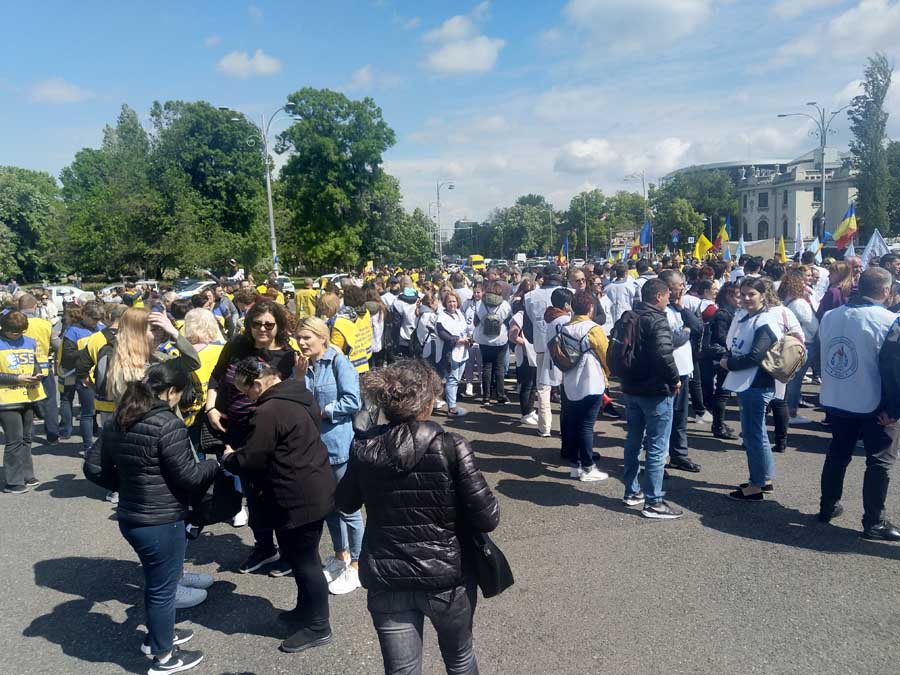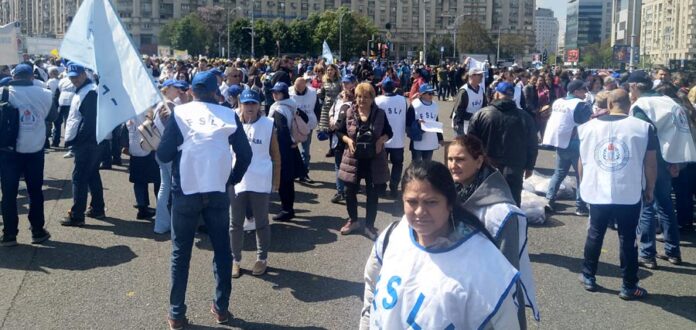On Wednesday, May 10, a protest march of education workers took place in Bucharest. Around 15,000 people, teaching and non-teaching staff, took part. A collective effort of several trade unions (FSE Spiru Haret, FSLI, Alma Mater), the march was held in anticipation of the general sectoral strike, which will start on May 22.
The Socialist Action Group (GAS) was present on the ground, in solidarity with the protesting workers. We tried to discuss with workers about the prospect of the education general strike which lies ahead, about the possibility to extend the strike to other sectors, about whether solidarity from students and parents has begun to emerge and about the levels of trust in political decision makers that still exists inside the workforce.
Those we spoke to reported that they are enjoying the support of parents and students, with some students even willing to join the protest in solidarity – a far cry from the lack of solidarity and even hostility that unionists were complaining about in February. So far, however, no student organization has commented on the strike. The punitive and carceral approach to violence in schools by FSE Spiru Haret representatives, who, in a series of proposals to the Chamber of Deputies, have called for punishments such as expulsion and fines, as well as the re-establishment of “re-education centers” for minors are certainly not a good way to build this solidarity.

The protesters are aware of the need to strike to enforce their demands and that rights are won through struggle. Confidence in the decision makers decreases for more experienced workers; for some, this is not their first strike and they are familiar with the deceptions of politicians. For younger participants, the massive mobilization leaves room for hope that the pay issue will be resolved.
The demands of the protest include wage increases and indexation to inflation, overtime pay, bonuses for working conditions, respect for legal rights and the collective labour contract, adequate investment in education (6% of GDP) and the replacement of the EduSal application [i] with a ministry-run program.
The government has so far not invited representatives of the trade unions that staged the march to negotiations. Since the protest was a warning, as those who were present told us, a general strike across the education sector is becoming inevitable.

The far-right forces did not miss the opportunity to prove once again whose interests they represent. To the dismay of the trade unionists, the march could not end in front of the Parliament, as, according to the FSLI, they had agreed in the protocol with the Bucharest City Hall. The AUR party decided to hold, in the same place and during the same time, a ‘spontaneous’ protest against PL-x 145 (a bill regulating a series of activities of social assistance and child protection services), under the pretext that the bill would allegedly propose to “kidnap children from their families”. We doubt it was a mere coincidence.
[i] The EduSal application is a software used to calculate the salary of education workers in Romania. It was developed by SIMAVI (Software Imagination & Vision), a private company which operates on an international level and is mainly employed by state institutions to develop and administrate the digital interface of public services such as health and education.



